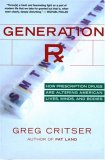Summary | Excerpt | Reviews | Beyond the Book | Readalikes | Genres & Themes | Author Bio

Critics' Opinion:
Readers' Opinion:
First Published:
Oct 2005, 288 pages
Paperback:
Jan 2007, 320 pages
 Book Reviewed by:
Book Reviewed by:
BookBrowse Review Team
Buy This Book
Some, if not most, of pharma's
immediate crisis was of its own
making, although this was not something
most drug CEOs would admit. As a
group and individually, they had simply
failed to invest in new drug sciences
and drug development. Instead, they had
relied on (and indeed encouraged)
the FDA's lack of a generic-drug
approval process, giving pharmaceutical
companies de facto monopolies — and huge
profit margins — on many
widely used drugs. This state of affairs
had provoked a legal backlash of its
own; district courts from New York to
California were actively contemplating,
and in some cases ruling, that many
traditional pharmaceutical patents were
invalid. The Supreme Court itself had
grown hostile to the very notion of
patents. In the pharma executive suite
of the time, there was only one word
for that: shock.
Yet some pharma problems were largely
out of the industry's
direct control. America in the late
1970s and early 1980s was going through
one of its cyclical periods of what
might be dubbed pharmaceutical stoicism.
As a percentage of annual health
expenditures, the Rx share was actually
shrinking. And while cocaine might be
hip, prescription drugs were uncool on
a number of levels. On the cultural
plane, drug makers were the domain of
the blue-chip world, with which the baby
boom had yet to fall in love. The
growing alternative-medicine movement,
with its reliance on herbs and
vitamins, appealed to a generation
concerned with what was natural. The
movie version of One Flew Over the
Cuckoo's Nest rekindled old suspicions
about psychiatric medications, one of
the industry's most profitable
monopolies. News stories about abuse of
Valium, one of the most profitable
postwar drugs, led to its
reclassification as a controlled
substance in 1978,
making it harder to prescribe. There
were scares over new heart medications
and horror stories about pharmaceutical
industry negligence, and a new
generation of ambitious politicians had
no qualms about capitalizing on such
fears. When a young congressman named
Albert Gore learned from a staffer
that a Pfizer attorney had made an
off-the-cuff remark about how expensive it
was to monitor the adverse events of one
of his products ("What, are we
supposed to schlep all over the world
just to track down one goddamn side
effect?" the attorney had sputtered),
Gore promptly publicized the incident.
Abroad and in D.C., big pharma was, more
than ever, big fair game.
Worse from the point of view of
pharmaceutical CEOs were
attitudes and trends among young
physicians and medical students. Many of
them were deeply suspicious of the
business end of medicine. Some of their
attitudes grew from social activism by
med students in the early 1970s, who
were concerned with overmedication and polypharmacy. (Overmedication is
the unnecessary use of medications in
general; polypharmacy is the
simultaneous use of several medications
to treat one or more conditions.)
The concern was deepest among young
psychiatrists. "In our day, it was
almost an aesthetic thing to be against polypharmacy," recalls one. "It was
more beautiful if you could do it with
just one or two pills." Many believed that
growing rates of polypharmacy were
fueled by pharma promotional activities,
like giving out free samples and
stethoscopes. "At national meetings, the
idea we talked about was to reject the
goodies," recalls Dr. Terry Kupers,
who was head of the Medical Committee
for Human Rights in the
1970s. "[Pharma sales representatives]
would show up at grand rounds, and
we would confront them and turn down the
goodies. We also went to our
intern meetings within our institutions
and told our supervisors that we did not
want [the reps] on grand rounds. It was
happening at enlightened medical
schools around the country. We did it as
a statement."
Copyright © 2005 by Greg Critser. Reprinted by permission of Houghton Mifflin Company.





The Funeral Cryer by Wenyan Lu
Debut novelist Wenyan Lu brings us this witty yet profound story about one woman's midlife reawakening in contemporary rural China.
Your guide toexceptional books
BookBrowse seeks out and recommends the best in contemporary fiction and nonfiction—books that not only engage and entertain but also deepen our understanding of ourselves and the world around us.